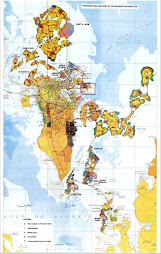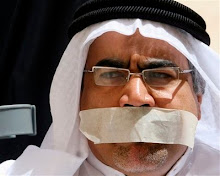Bahrain Chosen as Base for Media Freedom Campaign
Written by The Media Line Staff
Published Wednesday, April 29, 2009
The International Federation of Journalists has chosen Bahrain as the base for a new initiative to promote ethical and independent journalism in the Middle East and North Africa Region.
The program is being launched in a problematic political environment, as governments in the region are reluctant to give journalists a freer hand in their profession.
Also, the world of journalism is facing turbulence in light of the global economic crisis, and challenges from new media such as the Internet, which has compelled many outlets to restructure their organizations.
“Many in journalism feel that the falling standards in journalism have led to a dislocation between civil society and traditional media,” Aidan White, secretary general of the IFJ said.
“We feel it’s important to restore notions of mission and quality in journalism and get journalists to concentrate on what they do best, which is telling the truth, being independent and being aware of the consequences of what they broadcast and the images they put forward.”
But in the MENA region, this campaign is also seen as a vital tool for bringing about more democracy and freedom.
IFJ’s affiliates in the Middle East can put the notion of independent journalism on the table in their efforts to persuade their governments, many of whom are not interested in freedom of the press, to embrace free and independent journalism, White said.
“It’s an important initiative designed to enhance freedom of the press in the region and give journalists more confidence to do their work better.”
The fact that governments are likely to work against this initiative is one of the biggest challenges facing the program’s initiators.
“Governments working against freedom of the press are working against their own best interests,” White says. “Many say they want economic and democratic reform but in practice it’s a different story.”
Journalists work in a difficult legal landscape, where they can be jailed or fined for doing their job, he said.
The IFJ hopes they can approach governments with a proposal to enhance the quality of journalism in their countries, and in exchange, demand journalists be given more freedom to maneuver.
“Many of these countries don’t have recognizable democracies and are often regimes in which powerful families or royalty have the reins on power. It’s a question of opening them up, changing the culture of autocratic rule and making society more sensitive to different opinions,” he said.
“Its objective is not just to help journalists do their job better but also about changing the nature of the culture of democracy that operates in these countries.”
The choice of Bahrain as a base for the organization was made in order to get Gulf countries more engaged in the debate about democratic reform, particularly with regard to media, White said.
“It sends a strong signal to the [Bahraini] government that we expect them to move quickly to bring into place a new law which will make the conditions for exercising professional journalism freer and more effective,” he said.
However, not everyone thinks the program will be effective.
‘Abd Al-Jalil A-Singace, a human rights activist based in Bahrain, said past attempts of local and international NGOs to operate from Bahrain have not been successful because they were not allowed to operate independently.
“The idea itself is very much welcome,” he told The Media Line, “but the authorities try to exploit interest and requests for presence in this area to give the impression that they’re democratized and open, and that people can harbor their own views without being penalized. That’s not the case.”
A-Singace believes IFJ’s program will not be allowed to work as it should, and will suffer from interference from the government.
skip to main |
skip to sidebar

خارطة البحرين الجديدة
Facebook Badge
Followers
فسيلة السنكيس
متى ما ظهرت الفسيلة - الصغير من النخل- من فوق سطح الأرض، فمن حقها أن تنمو وان تعانق السماء دون حصار أو مضايقة أو استهداف
حق الفسيلة في الحياة كحق غيرها، من المخلوقات، خاصة وإن كانت دليل أصالة شعب كشعب البحرين
--------------------------------------------------------------
صاحب المدونة: د.عبدالجليل السنكيس
ناشط، كاتب وباحث أكاديمي من البحرين
البريد الإلكتروني: asingace@gmail.com
مدونة اخرى: http://alsingace.katib.org/
هاتف:8179-3966-973+
حق الفسيلة في الحياة كحق غيرها، من المخلوقات، خاصة وإن كانت دليل أصالة شعب كشعب البحرين
--------------------------------------------------------------
صاحب المدونة: د.عبدالجليل السنكيس
ناشط، كاتب وباحث أكاديمي من البحرين
البريد الإلكتروني: asingace@gmail.com
مدونة اخرى: http://alsingace.katib.org/
هاتف:8179-3966-973+
مواقع ووصلات ذات صلة Links of Interest
صور معبرة

خارطة البحرين الجديدة






